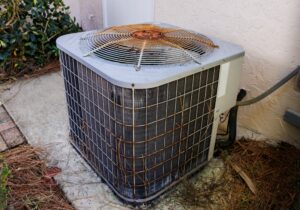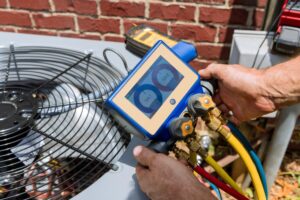At some point during homeownership, you will undoubtedly find yourself wondering how long an AC system is expected to last. Whether you’re already in the process of shopping for a new unit or you’re simply planning ahead to avoid any inconvenient breakdowns, this is a critical question with important implications. After all, understanding the average lifespan of an AC system can influence everything from budgeting for a future replacement to planning for routine maintenance. That’s why our expert technicians decided to break down how long air conditioners last and how you can tell your cooling system is nearing the end of its life.
How Long Do Air Conditioners Last?
A well-maintained air conditioning system typically has a lifespan of 15 to 20 years. Of course, this number can vary depending on several factors, such as the brand and model of the unit. In some cases, units can continue to function for more than 20 years, and in other instances, an AC system will only last 10 or 12 years.
At this point, you’re probably wondering why the average AC lifespan has such a large spectrum, and the answer lies in an array of factors. For example, systems that are neglected or improperly maintained are much more likely to suffer premature wear and tear and will often need to be replaced after only a decade or so. Additionally, units that are under- or oversized will struggle to perform properly, which will put extra strain on individual components, eventually leading to extensive wear that requires replacement. Usage habits can also affect the lifespan of your AC system — an overworked system may not last as long as one that’s used moderately or paired with a smart thermostat.
Regardless of maintenance, installation quality, and usage patterns, though, every AC unit will eventually reach a point where continued repairs are no longer practical or cost-effective.
Important Signs It’s Time to Replace Your AC System
While taking note of the average lifespan of an air conditioner is helpful, it’s also important to watch out for the telltale signs that your AC system is on its last legs. After all, as we just mentioned, some units last up to 20 years, while others only crank out cool air for 12 years. So, keep an eye out for the following problems that indicate you should consider an AC installation sooner rather than later:
Frequent Repairs Are Adding Up
It starts with one AC repair in the spring and then another in the summer. Before long, you’re calling your HVAC technician more often than your relatives. If you find yourself shelling out hundreds of dollars on repairs each year, it may be more economical to invest in a new unit altogether.
Inconsistent Temperatures Throughout Your Home
Have you noticed that some rooms in your home feel like the Arctic while others feel like a sauna? Uneven cooling is a common problem with aging AC units and heat pumps, often resulting from worn-out components or declining airflow. Replacing your system can restore balance and comfort throughout your living space.
Rising Energy Bills
Older air conditioners are less efficient than their modern counterparts. If your electricity bills are steadily climbing even though your usage hasn’t changed, your AC could be to blame. Consider a new energy-efficient model to keep your home cooler than ever before while also using less power.
System No Longer Under Warranty
When your AC system is no longer under warranty, every repair becomes an out-of-pocket expense. This can make even minor fixes feel like a financial burden, especially if your system is older and parts are harder to come by. For this reason, many homeowners prefer to view the expiration of their warranties as a key sign that they need an AC replacement. With a new unit (and the corresponding warranty) in hand, they can enjoy continued protection and peace of mind.
System Relies on an Old Refrigerant
Many older air conditioning systems rely on refrigerants like R-22, also known as Freon, which have been phased out due to their harmful effects on the environment. As of 2025, even newer refrigerants have been introduced, which is important to note because, if your AC still uses an outdated refrigerant, repairs can become more expensive and difficult. There, upgrading now future-proofs your home’s cooling system and helps you relax with ease.
Key Ways to Extend Your AC’s Lifespan
What if we told you that with the right care and attention, your air conditioner could run efficiently well past its average lifespan? While every system has a natural endpoint, there are several key strategies homeowners can follow to help extend the lifespan of their AC systems and delay the need for costly replacements.
- Stick to a Maintenance Schedule: Just like your car needs oil changes and inspections, your AC system benefits immensely from regular tune-ups. Professional AC maintenance should be performed at least once a year — ideally before the cooling season begins. During these visits, technicians inspect components, clean coils, lubricate moving parts, and identify potential problems before they cause significant damage.
- Replace or Clean Air Filters Frequently: A clogged or dirty filter restricts airflow, making your system work harder than necessary. Depending on your home, filters should be checked monthly and replaced every 1 to 3 months.
- Keep the Outdoor Unit Clear: Leaves, dirt, and debris can collect around the outdoor condenser unit, restricting airflow and diminishing your system’s performance. Keep at least two feet of clearance around the entire unit.
- Use a Programmable Thermostat: Reducing your system’s workload is another great way to prolong its life. Programmable or smart thermostats help regulate indoor temperatures more efficiently, preventing your AC from running continuously and extending its lifespan.
- Avoid Overworking the System: Setting your thermostat to extremely low temperatures won’t cool your home any faster but will cause the system to work harder for longer. Try to keep your thermostat at a consistent, energy-efficient temperature. Also, if your family frequently complains of rooms being too warm while others are too cold, consider investing in a ductless mini-split installation, which allows for zoned heating and cooling.
Explore Air Conditioning Installation Options With H.J. Faust
It can be tempting to keep an old system running for as long as possible. After all, why replace something that still works? But in reality, clinging to an aging AC system can cost you more in the long run due to inefficient operation, higher energy bills, and mounting repair costs. At some point, replacement becomes the smarter financial and practical decision.
Making that decision, however, doesn’t have to be overwhelming. Our team at H.J. Faust, Inc. is here to help guide you through the process. Our experienced technicians will evaluate your current system, assess your home’s needs, and recommend the ideal unit for your comfort and budget. We’ll then handle the installation and provide ongoing support and maintenance.
Contact our team today, and let us restore your home’s comfort with a reliable, efficient, and expertly installed cooling system.


